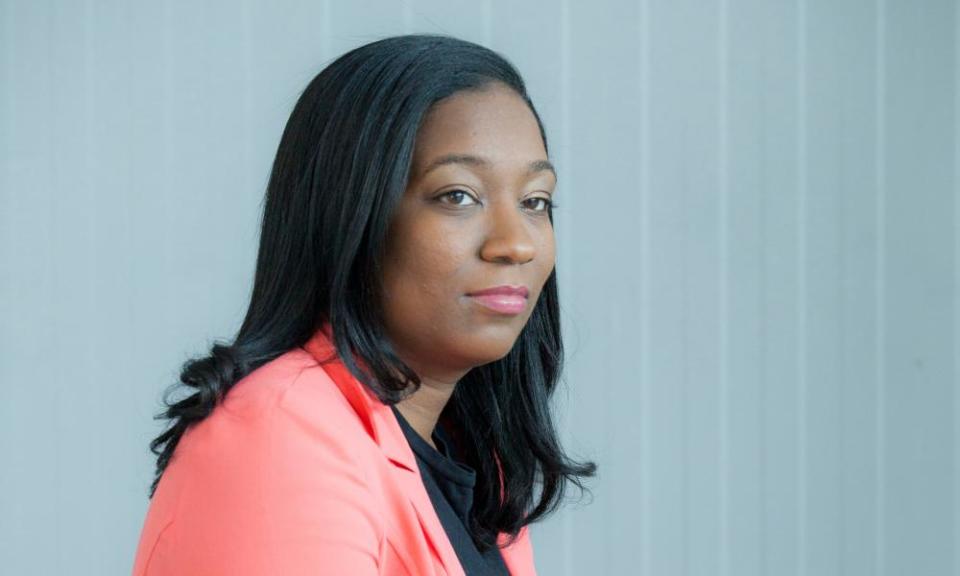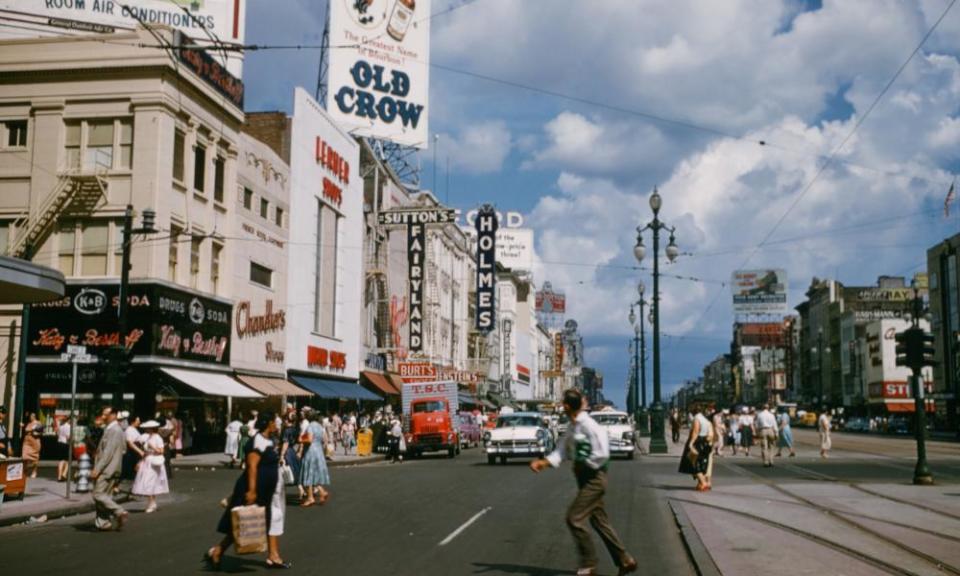Brit Bennett: ‘Trump colonised our brains for years. Suddenly he’s just gone? It feels surreal’

There was a rule to which Brit Bennett adhered during the writing of her novel The Vanishing Half. It is a sprawling blockbuster that opens in a small town in Louisiana in 1954 and unspools almost to the present day. It takes twin girls, Desiree and Stella, and through their divergent fortunes tells a story of race and class in America, in which history appears much closer than one might think. Bennett’s rule of composition was this: in a narrative heaving with sadness and disappointment, whenever the writing started to drag like homework, she broke off, only to pick up again when she’d rediscovered the joy. “Just write the parts that are exciting to you,” she thought, “and figure out later how you’re going to connect it.”
The smart premise of The Vanishing Half helped to propel it to the top of the bestseller lists in the US, where it appeared as one of the New York Times’s best books of 2020 and was longlisted for the National book award. Desiree and Stella, twin girls born and raised in the fictional town of Mallard, make a startling decision after running away in their teens. Mallard, which “had always been more of an idea than a place,” writes Bennett, is peopled exclusively with light-skinned African Americans, “fair and blonde and redheaded, the darkest ones no swarthier than a Greek”. After arriving in New Orleans, one twin decides to “pass” as white; the other remains black. Through this device, Bennett is able to explore not only “shadeism” and the arbitrary demarcations between racial groups, but other social boundaries, too. “A lot of stories about passing are about these multiple forms of passing,” she says. When Stella marries a wealthy white man, she is confronted with the task of not only performing whiteness (“there was nothing to being white except boldness,” writes Bennett), but performing wealthiness, too.
The Vanishing Half is Bennett’s second novel. Her first, The Mothers, in which she told the story of a 17-year-old girl recovering from the grief of her mother’s suicide, was published to acclaim in 2016. But it was an essay written by Bennett in Jezebel two years earlier that first vaulted her to public attention. Running under the headline “I Don’t Know What to Do With Good White People”, the then 24-year-old described her reaction to what she called the “self-aggrandisement” of “good white people”, self-flagellating in the wake of the death of Michael Brown, an unarmed black teenager shot by a police officer exonerated by a grand jury. She told a story of her father, a lawyer, who when he was a young man had been pulled over by the LAPD, cuffed and thrown on the kerb and had guns pointed at his head. They had mistaken him for someone else. “Sorry, buddy,” they said, dusting him off after realising their error. They had simply made a mistake; this was the fiction told and maintained and then interrogated by Bennett. As Bennett’s mother, who came from a family of sharecroppers in rural Louisiana, used to say: “It was a lot simpler in the rural South. White people let you know right away where you stood.”

Family stories inform the theme of intergenerational trauma that runs through The Vanishing Half. Early on in the novel, the twins witness their father being dragged out of the house, later to turn up dead after a lynching. When the twins grow up and have daughters of their own – Kennedy, wealthy and white, living in an affluent LA neighbourhood; Jude, stuck back in Mallard, where she is considered “too black” for the town – neither mentions to her child this terrible history of violence. But the children feel it, nonetheless.
“Kennedy has no idea what’s happened,” says Bennett. “She doesn’t understand why her mother is so distant from her, or why she’s so skittish; doesn’t understand these very foundational things because she has no information about the past. And yet she is, herself, this person who is always restless, always running. One of the pressing ideas [of the novel] was what does it mean to inherit so much from our parents?” Bennett considers herself lucky: “Both of my parents are still living and I have a very good relationship with them – we talk a lot. But there is, I’m sure, so much about their lives that they haven’t told me, will not tell me. Occasionally they’ll tell me a painful memory that comes out of nowhere, and you think, ‘Oh, you suddenly make more sense to me.’”
The question of trauma and how it communicates itself down the generations was central to Bennett’s motivation for writing the novel, which was published while Donald Trump was still in office. Plenty has been written in the US about black Americans “passing” as white, but those stories tend to be set earlier than Bennett’s novel, beyond living memory where they are easier to dismiss as irrelevant to today. This was not Bennett’s aim. “My mother went to segregated schools. For me, there’s no remove at all from this kind of issue. The idea that this is ancient history – it never felt ancient to me. I’m one generation away. That’s something I’ve always been aware of and it’s a reason why I wanted to write a story about passing that was a bit more contemporary than the traditional stories, that are usually early 20th century. I wanted a story that got you up into the late 80s and 90s, into thinking about the fact there hasn’t been that much time that has passed, at all.”
There was one very good reason for nailing the book to this timeframe. “I was aware that I was writing a book set in the past in this moment of really intense national nostalgia,” she says, “and that was something I was very suspicious about. The whole Make America Great Again nostalgia felt like TV: people are nostalgic for Leave It to Beaver, not about any moment that has ever really existed. They wanted to go back to this childhood that they saw on television – this gross nostalgia. It made me very aware that I wanted to write about the past in a way that felt honest, and real.” This period that Trump and his voters were yearning for, she says, was “this romanticised and false vision of the past”.
Bennett, who studied English at Stanford before doing an MFA at the University of Michigan, grew up in Oceanside, California, where both her parents worked in law. They were both also only one generation removed from poverty. Class interests Bennett as much as race. In The Vanishing Half, Stella’s cover as a wealthy white woman is almost blown when she displays the wrong kind of racism, attacking a new black family in the neighbourhood with a vigour her white neighbours consider unseemly. “I loved the idea of her always performing these categories wrong, and always trying her best; but even her husband thinks that the way she performs towards black people is tacky. It’s not that he’s supportive of civil rights. It’s that [her version of racism] is trashy.”
While Stella is struggling to pass as a white housewife in California, her twin sister, Desiree, is working as a fingerprint analyst in Washington DC, a job Bennett’s mother once held. It offers an almost too-perfect route into discussions around immutable identity, although it took Bennett a while to realise the gift her mother had given her. “These were just stories she’d told me,” she says. “She happened to arrive in DC a week before Dr King was assassinated, and coming from a small town found herself in the middle of this really intense moment, working for the FBI.” Her mother would entertain Bennett with stories of “how severed fingers would arrive for her to fingerprint, and I always thought it was fascinating, and wanted to write about it at some point. And when I started to write about it in this book, I thought: ‘OK, thematically this is very relevant.’”
My mother went to segregated schools. The idea that this is ancient history – it never felt ancient to me. I’m one generation away
Although their lives take such starkly different paths, neither of Bennett’s heroines transcends the unhappiness of her origins in that small, cruel town. But their children, in different ways, claim a future for themselves neither woman could have foreseen or thought possible. This, says Bennett, was the surge of joy she felt propelling her on to expand the story away from Mallard. Originally, it wasn’t going to be a multi-generational saga; but the prospect of spending more time in that town depressed Bennett as much as it did her characters, particularly Jude, the too-dark daughter whom the entire town hated. “It felt untrue to the spirit of these characters to go, here’s 100 pages of this person’s suffering. I think it would’ve been awful to read. To me, what becomes interesting about that character is how does she try to move on from this? To show her being bludgeoned over and over in this town, by these awful people, was a miserable thing for me to write emotionally and psychologically. And then I thought, ‘What if I just pick up with her leaving this place?’”
Jude escapes Mallard on a bus to LA, and the reader’s heart soars with her. It’s a gesture of hope, but of course her childhood demons flee with her. Does Bennett see the US, in the aftermath of Trump, as a country effectively still in shock from the recent past? “I feel that we’re in a moment of deep trauma from the past four years,” she says, “which we haven’t been able to process collectively. The strange thing with Trump is the fact that he has disappeared; a complete vanishing of him being gone from Twitter.” His absence, she says, was in the first instance almost as striking as his prior omnipresence. “This is a person who colonised our brains for years. I don’t think there was a day in the last four years when we were not constantly reacting or commenting or reading about the things he was saying and doing, or weren’t being affected in a visceral way by his actions and his whims, his moods and emotions. And suddenly they’re just gone? It feels very surreal.”
So, too, she says, does the sheer volume of news over the past few months. “Occasionally I’ll be talking to friends and be like, do you remember when there was a failed coup?” As Bennett’s novel suggests, all of this will have to be grappled with at some point. And for pragmatic political reasons, she would, she says, be happier if Trump were more visible. “I want eyes on him! Because there’s a very real fear that this man’s going to pop back up in four years – Trumpism hasn’t gone anywhere.” And yet there are days, she says, when the deafening silence from that quarter is almost akin to peace, or at least, the illusion of a short break from history. “I saw an article today: ‘Where has Trump gone?’” Bennett laughs. “And part of me was like: ‘Do we need to know?’”
• The Vanishing Half by Brit Bennett is published by Little, Brown (£8.99). To support the Guardian order your copy at guardianbookshop.com. Delivery charges may apply.

 Yahoo Finance
Yahoo Finance 